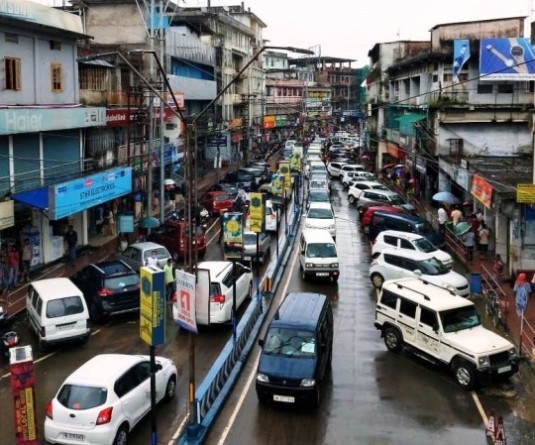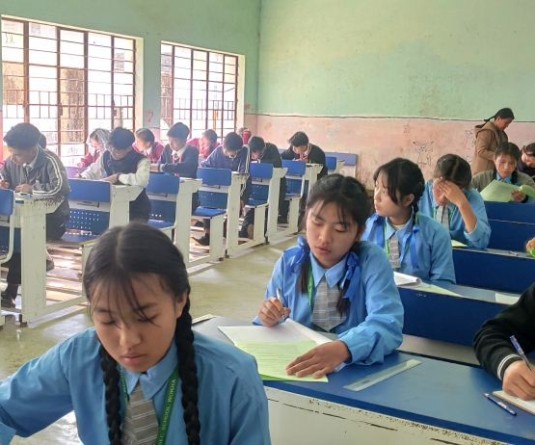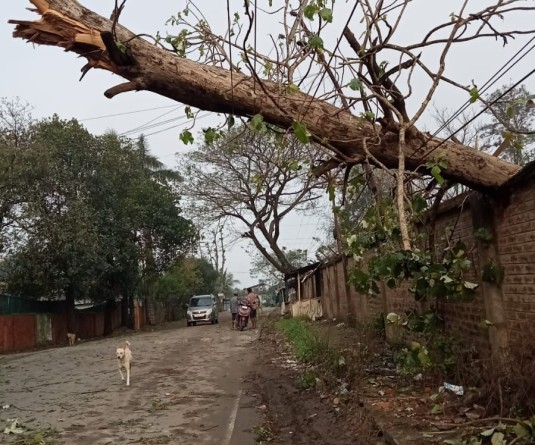Nagaland media urged to build new and better Naga society
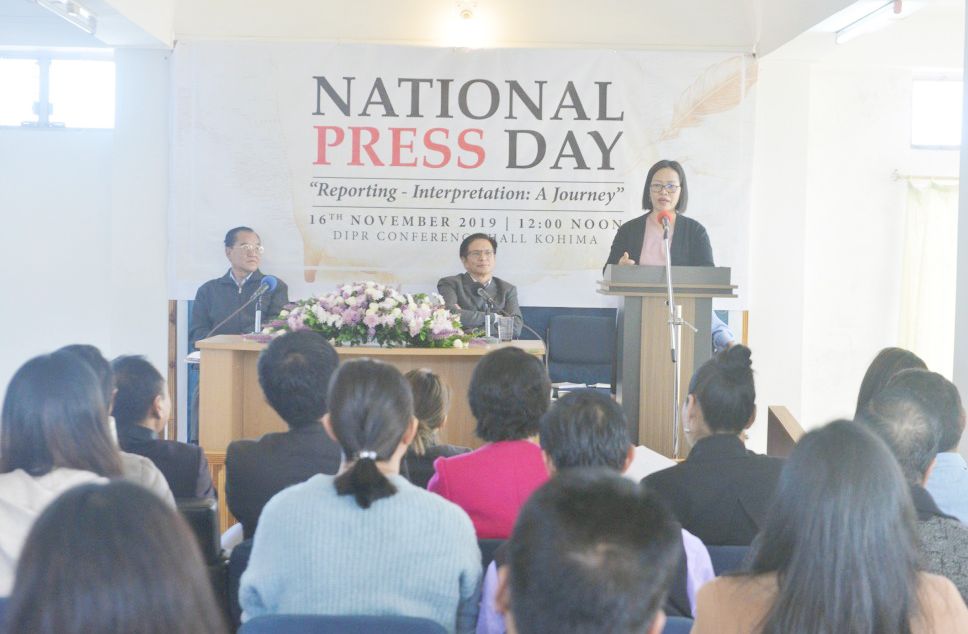
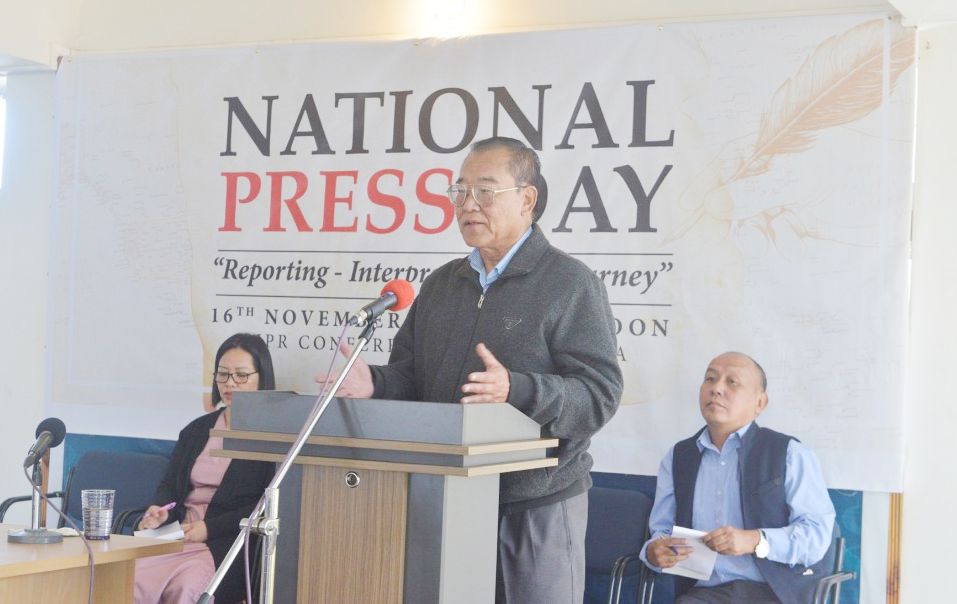
Heritage Publication editor, (top) Dr Asangla Tsudir and (bottom) Charles Chasie, former journalist and author addressing media people on National Press Day in Kohima. (DIPR Photo)
National Press Day 2019: Reporting– Interpretation: A Journey
Our Correspondent
Kohima | November 16
Press fraternity of Nagaland joined the rest of the country in observing National Press Day here today under the theme “Reporting– Interpretation: A Journey.”
National Press Day- the 16th of November is symbolic of a free and responsible press in India.
This was the day on which the Press Council of India started functioning as a moral watchdog to ensure that not only did the press maintain the high standards expected from this powerful medium but also that it was not fettered by the influence or threats of any extraneous factors.
Though there are several Press or Media Councils world over, the Press Council of India is a unique entity in as-much-as this is the only body to exercise an authority even over the instruments of the state in its duty to safeguard the independence of the press.
Media- powerful tool for shaping thoughts and minds of people’
Addressing the occasion as panelist, Heritage Publication editor, Dr Asangla Tsudir said ‘media is the conscious keeper of the people and that media is a powerful tool for shaping the thoughts and minds of the people’.
She remarked that media fraternity is caught between the fact and the truth telling and that this two should not be disassociated from responsibility in the context of harmony and wellbeing of the people.
She also reminded the media fraternity that people today are looking for a media or papers which can provide them with wholesome information covering all perspective from different angles.
She said that media houses in Nagaland need to evolve from the current trend of reporting and focus on disseminating information on what people wants rather than what media wants to report.
Stressing on reporting issue like sexual assault or domestic violence, she said that news reporting needs to go beyond the bounds of cultural stereotyping justice system and further provoke the justice system towards ensuring that justice is delivered to the victim rather than the oppressor.
She challenged all to ponder as to whether media should create information or just act as a medium to disseminate news without filtering just for public consumption.
She also said that print media needs to evolve as every media has its strength and weakness and depending on the quality news it provides the public will subscribe. She also said that for democracy to evolve, investigative journalism is the need of the hour in our state. On ethics of reporting she said a reporter must always have to be conscious that media is an important pillar of democracy and that the news or story should always give hope to the readers. As conscious keeper of the people and as responsible citizens she urged the media fraternity of Nagaland to continue evolving.
‘Fake news have become the new normal’
Another panelist, Charles Chasie, former journalist and author challenged media fraternity to be in the fore front of building new and better Naga society.
He said that the theme PCI has chosen is open enough and wide enough for everyone to interpret it the way they understand and that each needs to provide depth. He said a reporter must treat every news with the respect it deserves and that it is the reporter’s duty to provide adequate, accurate and objective information without bias or interpretation to the public.
He said that sensationalism and selective indignation were the two traditional sins of the media as all are prone to these infirmities from time to time despite one’s best efforts.
Today the situation of fake news has also become rampant and even become the "new normal," Chasie said.
He added that “deep fakes” imposes itself as a substitute reality in the form of a far more convincing presentation of "alternative facts “as it resembles concrete reality but may be entirely imaginary.
"Deep fakes, he said may have the potential to be destructive because they are arriving at a time when it already is becoming harder to separate facts from fiction."
Chasie also said the role of the media men and women have become much more challenging, especially serving a society like ours that has experienced prolonged violence and has become wounded and broken in the process. He added that Naga society has become dysfunctional, people are depressed and longing desperately for peace and wanting to hope.
Therefore the role of media at this juncture, when peace finally seems within reach of the people and society media are in a unique position to help bring healing and to give hope to the people, he said.
Earlier, IPR director Limawati Ao delivered welcome address while Nagaland Press Association (NPA) president H. Chishi moderated the panel discussion. The function was chaired Kohima Press Club president Alice Yhoshu while vote of thanks was proposed by Dimapur Press Club president Dilip Sharma.
The event was organized by Directorate of Information & Public Relations, Kohima Press Club, Dimapur Press Club and Mokokchung Press Club.


